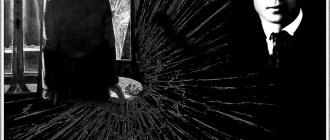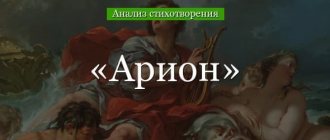The evolution of the theme of freedom in Pushkin's lyrics
Pushkin's lyrics are deep and multifaceted. However, the theme of freedom occupies a special place in it.
The poet never ceased to feel that freedom represents the highest moral value and meaning.
He expressed his understanding of this topic in most of his works.
There is a lot that goes into this concept. Freedom is necessary not only from tyrannical power in the person of the emperor, but also from the opinions of the crowd, from fear, selfishness, greed and other dark sides of the human soul.
Such freedom can be considered as the basis without which neither a dignified life nor creativity is possible.
However, throughout life, the attitude towards this developed and became more complex.
Lyceum period
During his lyceum years, Pushkin communicated with those who would later be called the predecessors of the Decembrist movement.
This happened in the period 1817 - 1820. Although these people protested against tyranny, their ideal was a constitutional monarchy.
The poet spoke out against tyranny, but not against the monarchy. His ideal was an enlightened ruler who would not allow the people to be oppressed.
The most concentrated expression of the desire for freedom during the Lyceum period were the works of:
- "Licinia";
- ode "Liberty";
- “To Chaadaev”;
- "Village".
Their analysis will be described in detail below. They had a great influence on the Decembrists and their supporters. In these works, classicism and rationalism merged with sincere impulses of the soul in the desire to fight against tyranny.
Southern link
At the very beginning of his exile, in 1823, Pushkin experienced a difficult crisis. At this time, personal and poetic, philosophical disappointment came together.
Pushkin viewed the revolutions that took place in Europe in the context of the struggle for people's freedom. The failure of these movements weighed heavily on him.
The views of this period were reflected in the works of “The Desert Sower of Freedom...”
and
"To the Sea"
. There is a sense of disappointment in these poems.
Later years
Gradually, the concept of freedom for the poet develops, and he begins to understand it in a more complex way. He realizes that, first of all, moral and creative freedom is needed, which will be the measure of social freedom.
The need for freedom of the victorious people
Byron's initial understanding of freedom by the poet could not be final. The reason is the dynamism of the era.
Alexander Sergeevich absorbed in his youth the patriotic enthusiasm of the Russian people that accompanied their victory over the French conqueror. The best intellectuals have already realized what productive potential of the Russian peasantry is not used in its development because of slavery. That is why the evolution of the theme of freedom in Pushkin’s lyrics can be traced. Against the backdrop of the titanic action of the war, the smug arrogance of the conquerors, the heroism of not only professional Russian officers, but also thousands and thousands of peasants, Byron's freedom now seemed unconvincing to the classics. After all, it was the desire of hundreds and hundreds of thousands of Russian people that lifted the club of the people's war and brought down the Invincible Armada on the heads.
The poet comes to understand the impossibility of a person gaining real freedom outside of society, changing only himself.
Poem "Licinius"
This work was written in 1815. At such a young age (he was 16 years old), the great poet, through the prism of ancient Roman history, saw how important the role of freedom is in human society.
In this poem, Alexander Sergeevich expressed the idea that it is precisely this that guarantees the progressive development of society.
Ode “Liberty” is evidence of Pushkin’s service to social freedom
Essentially speaking, the theme of freedom in Pushkin’s lyrics, which shifted to social accents, first publicly appeared in the ode “Liberty.” Its author no longer demonstrates an aristocratic, but a deeply popular civic position, which states that both serfs and nobles are equal before God.
Alexander Sergeevich dreamed that there would be no slavery on Russian land. This act of justice, according to the poet, should be accomplished by educated people, knightly fulfilling the mission of serving the Fatherland...
A minted syllable appears. The poet makes an appeal directly to his like-minded people (people with the worldview of the Decembrists).
Ode "Liberty"
Writing the ode “Liberty” was an original decision for the young poet. Literary circles of that time believed that this genre had already become obsolete.
However, the great poet did not seek to oppose himself to the existing literary tradition. He sought to emphasize continuity in relation to a similar work by Radishchev. At the same time, the difference between them was emphasized:
- Radishchev was a supporter of the people's rebellion against the supreme power;
- Pushkin was not so radical - his ideal was a more liberal government in the form of a constitutional monarchy.
It is important to note that at this time Emperor Alexander I also supported this idea.
The freedom-loving work was written in 1817.
In the initial part of the ode, Pushkin symbolically drives away
the “weak queen Cythera
,” the goddess of love and beauty Aphrodite. He believes that instead of tender lyrics, the time has come to sing of freedom.
Although he proposes to rebel against unjust tyranny, he nevertheless considers the ideal a harmonious combination of the king and the people, based on strict observance of the laws by both sides.
To prove this, he briefly cites the events of the French Revolution. In this situation, he believes that the law was violated by the people. Fate punished France by the fact that as a result, a dictator, Napoleon, came to power.
The second episode discussed in the essay is the murder of Paul I. Pushkin considers him a cruel ruler, and considers his death a consequence of a violation of the laws.
At the conclusion of the ode, the author gives instructions to the kings about what they should strive for in their reign. If they themselves strictly observe the laws, then their rule will be strong and long.
The ode “Liberty” was not published. It was rewritten and thus distributed.
"To Chaadaev"
This public figure had a great influence on the formation of Pushkin’s views on political realities and freedom. The poem was created in 1818.
In this work, the personal and the public are closely connected. The poet perceives the desire for freedom as the desire of the heart.
Speaking about Chaadaev, he connects him with Brutus in Ancient Rome and Pericles in Ancient Greece - famous tyrant fighters. The addressee of the poem was a hussar officer in the royal service. The poem illustrates the insight of a young soul.
Pushkin says that he is freed from the desire for love, hope, poetic glory and realizes the importance of striving for the freedom of the fatherland.
This work contains motives for abandoning the easy and pleasant for the sake of awakening to a difficult and real life, overcoming problems. Pushkin argues that the desire for heroic glory, for the fight against tyranny is important: “And on the ruins of autocracy they will write our names.”
Pushkin - author of the Decembrist anthem
The previously melancholic theme of freedom and slavery in Pushkin’s lyrics—romance—acquires a political overtone. It can not be in any other way. He was deeply impressed by his meeting with Pestel, his acquaintance with Pushchin, the Turgenev brothers, and Muravyov. Now he is sure: the entire way of life of society must be changed. Alexander Sergeevich, like his Decembrist friends, felt the obvious dissonance in the fact that the victorious soldier, returning home, again became a serf slave. He is inexorably, step by step, line by line, approaching realism...
He was tasked with preparing the publication of the society's political magazine, which the poet coped with. The classic outlined the ideological positions of the Decembrists in the poems “Village” and “To Chaadaev.”
And now in the poem “Village” something new, concrete, realistic appears in the poet’s creative style... Alexander Sergeevich clearly shows who really needs the most help from the advanced aristocracy and intelligentsia: the deprived peasant working on Russian soil and formally equated with agricultural property. The theme of freedom and slavery in Pushkin's lyrics turns into abstract, extremely specific, realistic poetic forms. How figuratively and succinctly the poet speaks about the antagonism between tyrant landowners and completely powerless serfs: “Mean slavery trudges along the reins of an inexorable owner!”
The poem “To Chaadaev” is considered the anthem of the Decembrists.
There is both a call for replacing the monarchy and faith in the future of Russia, “rising from its sleep.” The poem had a tremendous influence on the minds of young people. It spread throughout Russia by rewriting. By order of Emperor Nicholas I, the troublemaker poet was exiled. It is obvious that in addition to the two mentioned above, Pushkin wrote a number of pro-Dekabist works. However, they remained unknown, having sunk into oblivion: by order of the emperor, they were removed from the investigation and burned.
"Village"
This poem dates from 1819. It was created after visiting the village of Mikhailovskoye, his mother’s estate, located in the Pskov province.
During this trip, Pushkin felt an upsurge of creative forces and at the same time was horrified by the cruel conditions in which peasant life passed.
This comparison runs like a red thread throughout the entire work. On the one hand: “A haven of peace, work and inspiration...”
.
On the other: “But a terrible thought here darkens the soul...”
.
The poet came not for an idle pastime, but for freedom from the hustle and bustle, for the opportunity to concentrate on his creativity. A feeling of calm and serenity is one of the important conditions for intensive creative work. In the countryside, away from the hustle and bustle, the mind becomes clearer. "Idleness is free"
becomes
a "friend of reflection"
.
Rejoicing in relaxation and creative growth, Pushkin sees the misfortunes of the people around him. Corvée, debauchery and “violation of the individual” by landowners must stop and become a thing of the past forever. He sees service to the country in the fight against oppression.
The poet believes that the king should think about this and stop the slavery of the peasants. Pushkin did not consider a popular revolt as a means to achieve peasant freedom.
“Desolate sower of freedom...”
The epigraph to the poem, written in 1823, was chosen from the Gospel of Matthew, which says: “The sower went out to sow his seed.”
The lyrical hero of Pushkin’s poem feels the meaninglessness of his efforts.
“life-giving seed”
into
“enslaved reins”
no longer makes sense, because there can be no other result than disappointment.
The bitter experience, which is combined with the hardships of life at home, did not lead to freedom. Peoples will not fight for it, preferring material stability and tranquility.
In the final part of the poem, Pushkin says: “Why do the herds need the gifts of freedom...”
.
"To sea"
This work appeared in 1824. While in exile, the poet turns to the sea, considering it free. The poem is a message to the free elements.
The poet considers the sea his friend. The attitude is dictated by the idea that the author considers it the kingdom of freedom. However, freedom comes with risks: it can save the small boat or send a storm that will sink it. At this time, Pushkin is considering the possibility of escaping from exile on a ship.
He speaks with respect of Napoleon and Byron and says that after their deaths the world was empty. Now it is pointless to sail anywhere in the world: “Where there is a drop of good, there is enlightenment or a tyrant on guard…”
.
The poet concludes by saying that the poet’s creative imagination can transfer the powerful and freedom-loving image of the sea “to forests, silent deserts...”
.
"From Pindemonti"
This is one of the last works in the work of the great poet. It was born in 1836.
This poem, despite the title, is not a translation. It is largely polemical.
Here Pushkin in the first part denies traditional political freedoms. In conclusion, he proceeds to glorify creative freedom and existence according to the laws of poetry and beauty.
Freedom has been familiar to Alexander Sergeevich since childhood
The theme of freedom was close to Pushkin, based on his very essence. This is a unique person who became a poet by the will of God, who himself breathed this freedom, who created solely by inspiration, who in his entire short life did not violate a single principle of his!
The theme of freedom in Pushkin’s lyrics at the initial stage of his work sounded in accordance with the style that the poet followed at that time - romanticism. Let us note that internal freedom as a character trait deeply corresponded to his personality. The love of freedom of the future classic was formed in childhood: the unloved son in the family, he was left to his own devices. At the same time, his mother trained his sister, and his father trained his brother. A miracle happened, because of which all of Russia must bow deeply to Arina Rodionovna, the nanny of the little genius: the boy’s natural interest in folk tales and epics gradually grew into a commitment to art, into an inner need to create...




